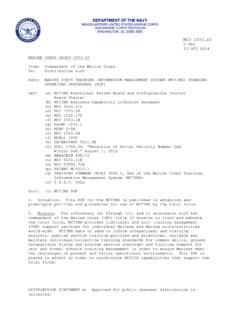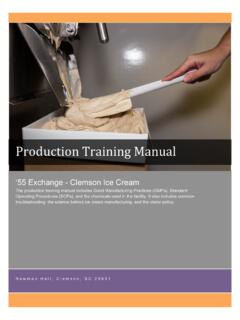Transcription of NYS Security Guard Manual - Radiant Training
1 NYS. Security Guard Manual TABLE OF CONTENT. Introduction .. 2. Lesson 1: Role of a Security Guard .. 3. Lesson 2: Legal Powers and Limitations .. 10. Lesson 3: Emergency Situations .. 39. Lesson 4: Communications and Public Relations .. 44. Lesson 5: Access Control .. 56. Lesson 6: Ethics and Conduct .. 60. Lesson 7: report Writing .. 64. Lesson 8: Field Note-Taking .. 68. Lesson 9: Observation and Patrol .. 71. Source: The Security Guard Act of 1992. NYS DCJS. 1. INTRODUCTION. The New York State Security Guard Act of 1992 requires that all people who work in the Security industry have a Security Guard license and Training to ensure that qualified individuals administer the duties of Security and protection of people from harm and property from loss.
2 The topics discussed in this lesson pertain to a Security Guard 's duties and responsibilities. Student Training Objective(s): Upon completion of instruction, the student will understand and be able to explain: The role of a Security Guard The legal powers and limitations of a Security Guard A Security Guard 's duties and responsibilities during emergency situations A Security Guard 's duties and responsibilities in regards to communications and public relations A Security Guard 's duties and responsibilities in regards to access control A Security Guard 's duties and responsibilities in regards to Ethics and Conduct A Security Guard 's duties and responsibilities in regards to report writing A Security Guard 's
3 Duties and responsibilities in regards to field note-taking A Security Guard 's duties and responsibilities in regards to observation and patrol 2. LESSON # 1: ROLE OF A Security Guard . Student Training Objective(s): Upon completion of instruction, the student will be able to: 1. Identify the functions, duties and responsibilities of a Security Guard . 2. Identify a Security Guard 's responsibility to detect, deter and/or report incidents. 3. Identify and/or list five factors contributing to effective performance of a Security Guard .
4 A. Preparing for patrol ( equipment, uniform, pre-shift briefing, post orders, etc.). b. Guard and public safety concerns c. Knowledge of patrol area(s). d. Recognition of potential environmental, health & safety hazards e. Observation skills f. Mental & physical preparedness 4. Identify effective patrol techniques of a Security Guard which may include, but are not limited to the following. a. Mobile patrol b. Foot patrol c. Fixed post (to include closed circuit television). 3. ROLE OF A Security Guard . The role of a Security Guard is to provide his or her employer with professional protective services, assisting in maintaining order and Security within a defined area.
5 Security Guards have a very difficult role when dealing with numerous parties in the course of the workday. At times, situations require Security Guards to wear different hats to deal with different situations and people. However, the ultimate responsibility of Security Guards is to protect people from harm and property from loss in the built environment. Property owners and managers have a responsibility to protect the people who occupy their properties, from retail stores to restaurants, from concert halls to hotels, from hospitals to corporate high-rise buildings.
6 Even though protecting the property occupants is a major function of Security Guards, it is the responsibility of each individual to find a means of protecting themselves from harm. It was in the 1950s that private companies began to hire Security Guards to maintain safety and patrol the companies' properties to protect their employees. Eventually, companies began to develop a protection management style more in line with the corporate culture of the institutions and retreated from the military look that was more popular at the onset of protection management of people and property.
7 In New York State Security Guards are private citizens who are employed by private companies. Private Security Guards, whatever their legal authority, perform their functions to further the policies of their employers or clients. It is the company that hires Security Guard that determines the tasks of the Security Guard . Because company cultures vary dramatically, it is the responsibility of the Security Guards to educate themselves about the policies that are introduced by the company. The property managers usually determine the policies and procedures that Security Guards are expected to know and execute while working in their assigned properties.
8 Besides company policies, Security Guards are expected to know the city and state laws that might have an impact on their actions or lack thereof. Throughout the time that the Security Guards work for private companies, Security Guards are expected to maintain a professional presence and demeanor. Through continual Training and exercises, Security Guards develop the skills necessary to interact and address the different incidents that will happen during their tenure in a particular property. Operations orders are designed by the property managers for the Security Guards to read, understand and execute while at work.
9 These orders indicate in detail the responsibilities of Security Guards. These orders serve as guidelines to ensure that Security Guards understand their roles. It is critical for Security Guards to be knowledgeable of their tasks and the operation of Security and fire/life safety systems in their properties. The following are systems that Security Guards should be familiar with and be able to respond to them effectively and efficiently. Properties have different types of alarms that Security Guard should be aware of.
10 Alarms include fire alarms, burglar alarms, water detecting alarms, LAN Room alarms and others. Security Guards should know the capabilities of the alarms as well know how to operate them and reset them when the incident is resolved. Operations orders will detail what the Security Guards' responsibilities are relative to their response to alarm activations. In most instances, operations orders indicate that the Security or fire safety director, the property manager and the tenant representative should be notified upon activation of an alarm in the building.





